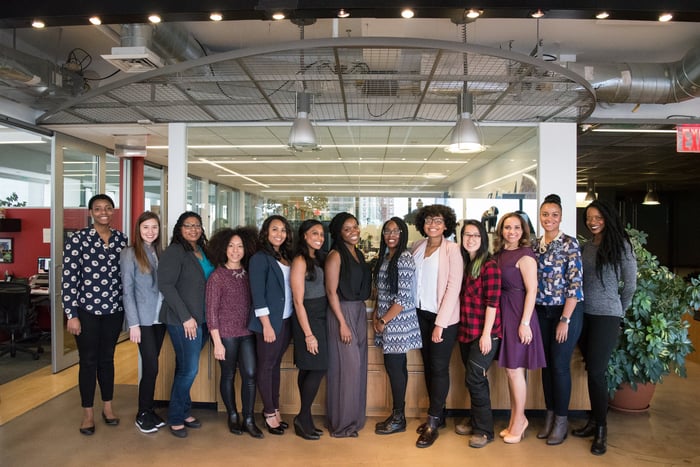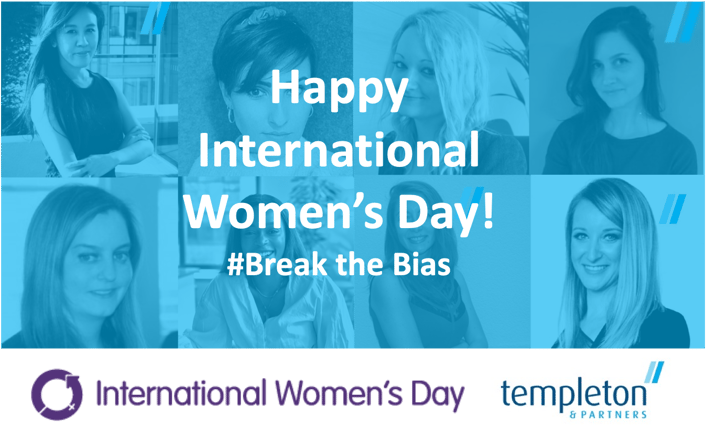Celebrated on 8th March annually, International Women’s Day exists to celebrate women’s achievements in history across industries and areas of life, increase visibility of career paths and choices for women, and highlight remaining areas of inequality. This year’s International Women’s Day theme is #BreaktheBias: striving towards a world free of bias, discrimination and stereotypes.
Are Business and Leadership Increasing Gender Diversity?
Whilst for the past decade many of the world’s largest businesses, in addition to SMEs and companies of all sizes, have committed to increasing female representation, change has been incredibly slow in all professional areas:
- Only 8 of the UK’s top companies are led by a female CEO, and only 27% of the FTSE 100 have any female executives
- Across 5,166 positions of power in society, women make up just under a third – 32% – meaning that 919 women are missing from the top roles
- Despite many recent reports that gender diverse companies outperform their competitors, women are under-represented and outnumbered by men at a ratio of 2:1 in the positions that shape our industries, politics, laws and culture.
Gender discrimination and bias also exist alongside other forms of prejudice. Women of ethnic minority background, LGBT+ women and women at different stages of their careers and lives report high levels of racism, homophobia and ageism across professions. Women with disabilities and women who are neurodivergent are rarely included in gender diversity initiatives, even though every aspect of women’s lives is a factor in career success. Businesses must strive for a more intersectional attitude and listen to perspectives of women from all backgrounds to increase representation in leadership and across organisations.
What is the State of Gender Diversity in the Tech Sector?
The state of gender diversity for women in tech is further behind than many other industries:
- Only 19% of tech specialists in the UK are women, decreasing to just 17% in Europe as a whole. For women of ethnic minority background in the USA this figure is even less, with the representation of black and Hispanic women in tech at just 3% and Asian women at 5%
- Just one in ten female tech professionals are in management or leadership roles
- 60% of female IT specialists report a gender pay gap in the sector
- Although the number of women working in IT roles has grown significantly in the past decade, female representation in the technology sector has stalled over the last 10 years.
As a diverse and inclusive recruitment agency, Templeton are 65% female with 50% female leadership. Here our team reveal their own experiences in tech recruitment and the workplace in general, how they think business still needs to change, and how we can all collaborate to drive gender equality at work.
Why is International Women’s Day Important?
Caroline Rademaker, Head of Netherlands Recruitment, Amsterdam Office – I’ve never felt like I was treated any differently to men that I studied and worked alongside, but I’m aware this isn’t the case for many other women. There are still many women who are subjected to the ideology that women play a limited role in society, for example, the expectations of motherhood and the effects of becoming a mother on a woman’s career.
On International Women’s Day, I believe seeing other women who have achieved greatness in their career will motivate and inspire other young girls and women. IWD shows that the number of women excelling professionally is growing, but also helps to break harmful ideas of women at work, such as the ‘Imposter Syndrome’ and lack of confidence many women feel on a regular basis, and incorrect perceptions that women will be treated more favourably due to their appearance or that gender quotas will result in ‘positive discrimination’ against men.
International Women’s Day is a powerful way to showcase women’s success, reinforce that women can be just as successful as men with the right tools, development and support, and to address the stigmas and unconscious biases that still need to change.

What Aspects of Business and the Workplace Still Need to Change to Better Support and Develop Women?
Liliane Solomo, Senior Recruitment Consultant, Templeton’s London Office – When I started in the industry, recruitment was a very male-dominated environment and women were normally limited to delivery/account management in their roles rather than leading new business relationships with clients and playing major strategic roles. I was always treated as the ‘stereotypical woman’ who fit into a certain type of box, but I always believed in my craft, talent and what I could bring to the table. I never let what others said tear me down, and today I feel more successful than ever because I believed in myself. I’m now seeing women push themselves to break the tradition and become the best version of themselves. As a recruiter, this has been extremely positive: without us knowing it, we are changing the narrative of women in recruitment. Our successes – promotions, business development etc – have opened recruitment to a whole new world that felt almost impossible just a few years ago.
I think, as women, we need to continue to support each other. There’s often a pressure to be more ‘assertive’, ‘aggressive’ or behave in a more ‘male-typical’ way to get ahead; we need to try to step away from that line of thinking, and not allow our environment to make us compete with each other rather than focus on the inequalities that affect us all. Also, I feel we need to be able to really believe that we can achieve whatever we put our minds to, without judgement from others, regardless of our gender and perceptions related to our gender.
Employers and colleagues can drive change straight away by creating the environment where teams work collaboratively and welcome all ideas and solutions, committing to a zero-tolerance policy for discrimination, and being supportive of women’s choices. To other women, I would say: believe in your craft, even when others don’t – your career and your achievements were gained through your own hard work and skills, and you deserve every success you get. As you continue to achieve your goals, others will also begin to value your hard work without needing you to justify how you got there. Never limit your potential. Trust in yourself to succeed and trust in others to grow and change.
What Are Your Experiences of Supporting Women in the Workplace?
Mike Beresford, Group Commercial Director, Templeton’s London Office – In my experience, women make the best recruiters! The best recruitment consultants I’ve worked with and managed have been female. Whilst I firmly believe that your background or group does not in any way determine your skills or ability, some of the women I know have felt like they had to push harder than their male colleagues to achieve the same success, on which they built the dedication that made them excellent at their jobs.
The ’stereotypical’ skills of women in the workplace are needed by everyone at all levels of any company. So-called ‘soft skills’ like communication and organisation are increasingly vital to helping organisations solve problems in Industry 4.0 with so many challenges and potential opportunities. Businesses need to increasingly prioritise these types of leadership and management skills, ahead of just someone who is a high performer at their current job. Many of the people-centric qualities that employers expect from women but not men can be harnessed with the right investment in development, to share and build these skills across genders for the benefit of the whole business and every employee.

How Can We Be the Best Allies for Women and Diverse People in Any Professional Environment?
Aimee Treasure, Head of Marketing, Templeton’s London Office – The best thing employers, managers and colleagues can do to drive gender diversity is to listen. Business leaders might believe they know exactly which obstacles are preventing female employees’ progress and will be fully on board with introducing new measures to tackle these obstacles. We know from our Diversity in Business Report that most leaders understand the importance of Diversity and Inclusion and want to see a more gender equal workplace, however, we also know that all too often, companies are investing in the wrong D&I initiatives that then don’t help women’s career development and don’t yield more applications from female candidates.
The barriers preventing women’s success are broad: whilst they do include access to affordable childcare and the balance between motherhood and work, millions of women in countries all over the world are held back by unconscious biases, the beliefs they’ve learned from a society that undervalues and under-supports women, and most crucially of all a lack of investment in training and career development. The best thing anyone can do as an ally is ask questions and truly listen to the answers. Find out what’s stopping the women you know from getting their next promotion, what they really want and need from their workplace, what their career goals are and exactly what can be done to support them. Listen to the diverse people in your teams, and truly invest to provide the opportunities, development and support they need to empower themselves.
How Managers and Leaders Can Support Gender Diversity
68% of business leaders report struggling to recruit diverse candidates, despite significant investment in D&I. Here are the initiatives that are actually improving diverse representation.
Templeton’s diverse team have 26 years’ experience recruiting women into IT roles across industries, specialisms and the world. Find out more about our award-winning recruitment services.





